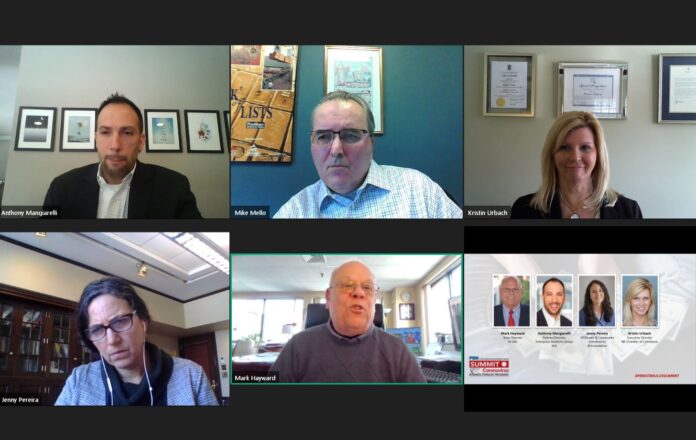
PROVIDENCE – The dizzying array of state and federal relief programs rolled out over the last year is enough to trip up even the savviest small-business owners.
Panelists representing the accounting, nonprofit, business services and government sectors shed light on the latest rules and requirements for small-business relief during Providence Business News’ 2021 Coronavirus Business Stimulus Summit on Thursday.
The discussion centered on federal relief programs extended or amended in the December stimulus package, including the second round of the U.S. Small Business Administration Paycheck Protection Program.
While certain restrictions in the latest program – namely a 25% quarterly revenue loss for second-time applicants – may render some struggling businesses ineligible, the program is largely meeting its intended goal: helping hard-hit small businesses keep workers on payroll, said Mark S. Hayward, U.S. Small Business Administration Rhode Island District director.
As evidence the program is working, Hayward pointed to the $504 million approved across more than 5,500 loans to Rhode Island small businesses, nonprofits and other eligible entities as of Feb. 7.
“I think we’re doing extremely well … I fully anticipate that number going up significantly,” Hayward said.
Expansions that allow recipients to spend the money on other expenses such as facilities modifications are also critical, as is the opening of the program to previously ineligible 501(c)(6) entities such as chambers of commerce.
Kristin Urbach, executive director for the North Kingstown Chamber of Commerce, said the forgivable payroll loan will help the Chamber continue its own support for the small-business community amid canceled fundraisers and events.
While PPP has attracted the most attention, other state and federal relief programs are not to be discounted. Hayward highlighted traditional SBA loans, which offer a 90% guarantee and include six months of principal and interest payments by the SBA at this time.
The Rhode Island Foundation also shored up dozens of nonprofits with $15 million in COVID-19 relief in 2020, helping them continue critical services even before the first round of federal programs were available through the Coronavirus Aid, Relief, and Economic Security Act, said Jenny Pereira, Rhode Island Foundation vice president of grants and community investment.
State grants for businesses that adapted operations during the pandemic or offering technical assistance have also been critical; the North Kingstown Chamber as a recipient of an R.I. Commerce Corp. Business Technical Assistance Grant has continued to offer free technical consultation to members and other businesses, as well as weekly roundtable discussions.
Still, understanding and applying for these many grants and loans can be confusing, panelists agreed, emphasizing the need to reach out for advice and education.
It’s also important not to lose sight of business operations in a flurry of relief programs, advised Anthony J. Mangiarelli, partner and director of enterprise solutions group for Kahn, Litwin, Renza & Co.
For instance, a business owner so intent on qualifying for PPP loan forgiveness that he or she spends all the funding on payroll may be better served using some of that money for other costs, even if it means paying back a portion of the loan, he said.
And as the pandemic approaches the one-year mark with no clear end in sight, taking the long view of business survival should be the No. 1 priority.
“This is like a heavyweight boxing match,” Mangiarelli said. “It’s not how hard you hit, it’s how hard you get hit, and we’re probably in round seven or eight of that fight.”
(UPDATES 12TH paragraph to note services also available to nonchamber members; minor edits.)












